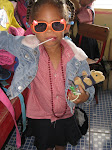


Aguas Negras, meaning Black Water, is the name of the community bordering the customs port of Puerto Plata. More than a thousand families reside here in the warren of crumbling concrete and rusting tin. The dirt roads run with rotting trash and sewage. Most homes do not have toilets, and there is a community latrine that members of our group describe as “inhumane” and “foul beyond comprehension.”
About 40 of us have come here today for various service projects – painting homes, laying concrete on a dirt road, serving breakfast in a school for undocumented children. I have come to assist with the delivery and installation of a water filter in a local home.
First everyone gathers at the school, where we meet its founder Sandra, truly a saint of a woman, and her eyes shine with the love of God. She is a pastor in this community, and she has worked hard to acquire birth certificates for these children so they have hope of future education and jobs. But unlike the program in La Mosca, this is a true school, with teachers and uniforms, desks and backpacks. The children are bright-eyed and beautiful, happily receiving little gifts our group has brought. One nina of about 5 strings new plastic beads around her neck, pops heart-shaped sunglasses on her face and a Tootsie Pop into her mouth. She holds a tiny teddy bear with a Rotary T-shirt on. Truly the sweetest little diva I’ve ever seen.
Everyone gears up for their work projects, and we meet with Sara, who works in this neighborhood for Project Las Americas. Sara is a beautiful, extremely petite woman originally from Spain. She seems to know each person in this barrio personally, and as we gingerly step between foul puddles on the road, she stops to wipe a child’s nose, to ask another how his mom is feeling, and to laugh at a mangy barking mutt who is paradoxically named Allegria, or Happiness. Sara is a tiny powerhouse, a model of service.
We watch her demonstrate the assembly of a blue plastic HydrAid water filter. There are several parts that must be put together correctly so the filter does not leak. We ask her how she has chosen the people who will receive this today. She says one way she knows they are ready is if they understand the value of agua pura enough to fetch it from the filter at the school.
There are some community taps which only turn on about every three days, so fetching and storing water are just the way of life here. But bathing in this water gives the women constant infections that often result in cancer. And drinking it leads to untold numbers of health problems. But, Sara says, the people do not understand that their lifelong poor health is connected to the water. Education is a huge first step in this process.
Sara has a teenage assistant, a boy from Aguas Negras, who she is training up so that he understands the filters as well as she does. We carry the filter bucket, a diffuser tray, three bags of sand, a chlorine dropper, and written instructions. “Permiso,” Sara calls as we enter the small concrete abode. Andrea, the homeowner, graciously welcomes us inside. She has prepared a spot in her tiny kitchen for the filter and her 15-year-old daughter is here to watch. The sand must fill the filter to a precise level, in different textures, from gravel to a finer grain. Sara explains each step and carefully cleans the clear output tube with bleach. Andrea listens closely and asks questions, pointing to the illustrated instruction brochure.
We talk with Andrea, again stretching my rudimentary Spanish. We admire her high school diploma on the wall, and the photos of Evelyn’s quincinera. Her face is open and appreciative, and she tells us proudly about her 4 children. When it is time to go, I wish good health and God’s blessings to Andrea. She squeezes her face to mine, kisses me on the cheek, and with tears in our eyes we embrace.
As we pick our way through the muck toward the bus, our hearts are warm with love for Andrea and all these dear people in Aguas Negras.








No comments:
Post a Comment